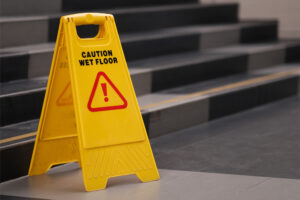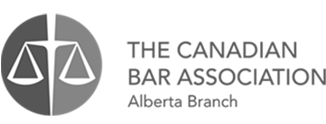Workplace Slip and Fall Incidents
According to the Canadian Centre for Occupational Health and Safety (CCOHS), 44,000 workers suffer slip and fall accidents yearly. For some, the pain and disability are temporary. For others, the disability can be long-term or permanent. Tragically, some workers even lose their lives.
Their workers’ slip-and-fall accidents also impact employers through worker absenteeism and sometimes re-integrating and re-training severely injured workers. Employers and employees working together to eliminate the conditions precipitating slip-and-fall accidents benefit everyone.
In Alberta, the experienced personal injury lawyers at Chadi & Company are committed to serving workers and employers. We help injured workers receive the medical treatment and compensation they deserve and help employers conduct safety audits to create the safest possible workplace.
Table of Contents

Understanding Employer Responsibilities
Employers in Alberta are required to maintain a safe workplace. Doing so involves two key responsibilities: ensuring the workplace is safe and workers are trained in safety protocols.
Maintaining a safe workplace includes attending to and correcting conditions that might invite a slip and fall accident, for example:
- Cleaning up spills right away
- Cleaning up wet or oily surfaces
- Securing loose rugs or mats
- Removing or isolating hazards from weather, such as puddles or ice
- Removing obstructions or clutter on the floor
- Remediating uneven or irregular walking surfaces
- Making certain all working areas are well-lit
According to Alberta’s Occupational Health and Safety (OHS) legislation, employers are required to do everything they reasonably can to protect the health and safety of their employees, including:
- Ensuring workers have the skills and training necessary to perform their duties in a healthy and safe manner
- Making sure supervisors are trained and competent
- Preventing violence and harassment in the workplace
- informing workers of any workplace health or safety hazards
- Establishing safe work practices and ensuring they are followed
- Providing safety equipment and training
- Properly labelling and storing dangerous chemicals
- Investigating serious injuries and incidents
- Investigating potentially serious incidents
- Working with the health and safety committee or representative
- Meeting OHS and Employment Standards Code requirements
Rights and Compensation for Affected Workers
If you have experienced a slip and fall accident at work in Alberta, you have the rights:
- You have a right to make a claim to the Alberta Workers’ Compensation Board (WCB). It is illegal for your employer or your supervisor to request that you refrain from making a claim.
- You are eligible to receive benefits no matter who is at fault for the accident.
- You (and your employer) are immune from lawsuits from anyone else who is also protected under the workers’ compensation system.
- Compensation should be fair, recognizing the nature of your injury and the impact on your earnings.
- You can expect fairness and impartiality from WCB-Alberta on any issue arising under the Workers’ Compensation Act.
- You are entitled to ask for a review of your benefit decision within 12 months of the decision date.
- The WBC presumes that you are honest unless you have demonstrated otherwise.
- WCB-Alberta employees will treat you with courtesy and respect.
- You can access information about your claim.
- Your privacy and confidentiality will be respected.
- You have access to your claim file, and there is no charge for your first copy.
How will the claim process work?
The exact process will depend on your particular injury and the length of your recovery. In any case, you may work with several people at the WCB. Once your claim is registered:
- Your claim will be assigned to an adjudicator to confirm your eligibility for benefits.
- If your injury prevents you from returning to work immediately (even with adjustments to your duties), your claim will be assigned to a case manager.
- Your case manager will work with you to develop a proactive rehabilitation and return-to-work plan. The case manager will maintain regular contact with you, your employer, and your treatment provider to make sure you can receive the treatment you need to recover and safely return to work.
Available benefits
Once your claim is accepted, you will be entitled to certain benefits, depending on what you need to recover and return to your job:
- Your wages will be replaced based on 90% of your net earnings.
- Your medical treatments will be coordinated and paid for.
- If serious injury prevents you from performing household tasks and you have no one in your home to help, services for a multitude of functions (house cleaning, meal preparation, wound care, etc.) will be coordinated and paid for.
- If you are severely injured and permanently impaired, you will provided with long-term personal care assistance.
- For severe injury that requires changes to your home and/or car, home and/or car modifications will be coordinated and paid for.
- If you need medical treatment outside your city, your travel will be coordinated and paid for.
- If you are injured, your employer must offer you modified work as soon as it is safe for you to return.
- If no reasonable arrangement for return to work can be made with your employer, you are entitled to have a specialist work with you for re-employment.
- If your functioning has been so seriously compromised (loss of body part, system, or function; disfigurement) that you cannot work, you may be entitled to a lump sum permanent impairment payment.
Preventive Measures and Best Practices
Many slip and fall accidents can be prevented. When employers work with employees’ health and safety committees to address areas of concern and proactively cooperatively develop safety protocols, everyone becomes invested in operating as safe a workplace as possible. Some of the steps that can help prevent slip and fall accidents include:
- Making good housekeeping an everyday practice
- providing good lighting for all work areas and walkways
- keeping walkways free of clutter
- covering cables and similar impediments across walkways
- securing floor coverings like mats and carpets so they do not slide
- keeping floor surfaces free from debris
- making a habit of closing file cabinets and drawers
- removing and cleaning spills right away
- marking spills and wet areas until they can be cleaned
- Reworking flooring, particularly walkways, to be non-slippery
- Encouraging everyone in the workplace to wear appropriate footwear and to walk at a safe pace for the conditions
Can a Workplace Slip and Fall Victim Sue the Employer?
In Alberta, via the Workers’ Compensation Act, and across Canada with similar insurance schemes, most workers have access to insurance that compensates them for workplace injuries regardless of fault and, notably, regardless of the employer’s ability to pay. Employers regularly pay into the insurance fund whether or not they have any workplace accidents so that employees across Alberta (similarly to other provinces) have access to adequate compensation if they are injured on the job. This available compensation for workers is part of what is called the “historic trade-off.” In return for this insurance, they are prohibited from suing their employers or fellow employees.
The ”historic trade-off” principle was reaffirmed in 2013 by the Supreme Court of Canada in the case of Marine Services International v. Ryan Estate. When their fishing vessel capsized, the Ryan brothers were drowned. Although Marine Services did not employ them, they were covered by the Newfoundland and Labrador Workplace Health, Safety and Compensation Act (similar to Alberta’s WCA), under which the widows and dependents of the brothers received compensation. Their estates also sued Marine Services and one of its employees for negligence in the design and construction of the vessel that capsized. Marine Services insisted they could not be sued because of the “historic trade-off.” The Supreme Court agreed.
Legal Advice
When employers and employees continually work together to prioritize safety in the workplace, everyone benefits. Working conditions become more secure and reliable. Employers help minimize workers’ injuries from slip and fall and other accidents. Workers help employers meet their OHS responsibilities. An atmosphere of trust and cooperation is fostered throughout the business.
We at Chadi & Company encourage you to review your workplace safety policies and become further educated on the issue. Our experience with injury cases can provide valuable assistance. We offer consultations online or by telephone at (780) 429-2300.






